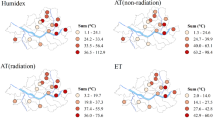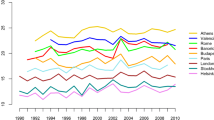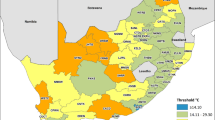Abstract
Heat-related deaths should be somewhat preventable. In France, some prevention measures are activated when minimum and maximum temperatures averaged over three days reach city-specific thresholds. The current thresholds were computed based on a descriptive analysis of past heat waves and on local expert judgement. We tested whether a different method would confirm these thresholds. The study was set in the six cities of Paris, Lyon, Marseille, Nantes, Strasbourg and Limoges between 1973 and 2003. For each city, we estimated the excess in mortality associated with different temperature thresholds, using a generalised additive model, controlling for long-time trends, seasons and days of the week. These models were used to compute the mortality predicted by different percentiles of temperatures. The thresholds were chosen as the percentiles associated with a significant excess mortality. In all cities, there was a good correlation between current thresholds and the thresholds derived from the models, with 0°C to 3°C differences for averaged maximum temperatures. Both set of thresholds were able to anticipate the main periods of excess mortality during the summers of 1973 to 2003. A simple method relying on descriptive analysis and expert judgement is sufficient to define protective temperature thresholds and to prevent heat wave mortality. As temperatures are increasing along with the climate change and adaptation is ongoing, more research is required to understand if and when thresholds should be modified.

Similar content being viewed by others
References
Basu R (2009) High ambient temperature and mortality: a review of epidemiologic studies from 2001 to 2008. Environ Health 8:40
Carson C, Hajat S, Armstrong B, Wilkinson P (2006) Declining vulnerability to temperature related mortality in London over the 20th century. Am J Epidemiol 164:77–84
Davis R, Knappenberger P, Novicoff W, Michaels P (2003) Decadal changes in summer mortality in U.S. cities. Int J Biometeorol 47:166–175
Filleul L, Cassadou S, Medina S, Fabres P, Lefranc A, Eilstein D, Le Tertre A, Pascal L, Chardon B, Blanchard M, Declercq C, Jusot JF, Prouvost H, Ledrans M (2006) The relation between temperature, ozone, and mortality in nine French cities during the heat wave of 2003. Environ Health Perspect 114:1344–1347
Fouillet A, Rey G, Laurent F, Pavillon G, Bellec S, Guihenneuc-Jouyaux C, Clavel J, Jougla E, Hemon D (2006) Excess mortality related to the August 2003 heat wave in France. Int Arch Occup Environ Health 80:16–24
Fouillet A, Rey G, Wagner V, Laaidi K, Empereur-Bissonnet P, Le Tertre A, Frayssinet P, Bessemoulin P, Laurent F, De Crouy-Chanel P, Jougla E, Hemon D (2008) Has the impact of heat waves on mortality changed in France since the European heat wave of summer 2003? A study of the 2006 heat wave. Int J Epidemiol 37:309–317
Haines A, Kovats S, Campbell-Lendrum D, Corvalan C (2006) Climate change and human health: impacts, vulnerability, and mitigation. Lancet 367:2101–2109
Hajat S, Armstrong B, Baccini M, Biggeri A, Bisanti L, Russo A, Paldy A, Menne B, Kosatsky T (2006) Impact of high temperatures on mortality: is there an added heat wave effect? Epidemiology 17:632–638
Hajat S, Sheridan S, Allen M, Pascal M, Laaidi K, Yagouti A, Bickis U, Tobias A, Bourque D, Armstrong B, Kosatsky T (2010) Heat-health warning systems: a comparison of the predictive capacity of different approaches to identifying dangerously hot days. Am J Public Health 100:1137–1144
Josseran L, Nicolau J, Caillere N, Astagneau P, Brucker G (2006) Syndromic surveillance based on emergency department activity and crude mortality: two examples. Euro Surveill 11(12):225–229
Josseran L, Fouillet A, Caillere N, Brun-Ney D, Ilef D, Brucker G, Medeiros H, Astagneau P (2010) Assessment of a syndromic surveillance system based on morbidity data: results from the Oscour(R) network during a heat wave. PLoS One 5
Kaiser R, Le Tertre A, Schwartz J, Gotway C, Daley W, Rubin C (2007) The effect of the 1995 heat wave in Chicago on all-cause and cause-specific mortality. Am J Public Health 97(Suppl 1):158–162
Kovats R, Hajat S (2008) Heat stress and public health: a critical review. Annu Rev Public Health 29:41–55
Le Tertre A, Lefranc A, Eilstein D, Declercq C, Medina S, Blanchard M, Chardon B, Fabres P, Filleul L, Jusot J, Pascal L, Prouvost H, Cassadou S, Ledrans M (2006) Impact of the 2003 heat wave on all-cause mortality in 9 French cities. Epidemiology 17:75–79
Léon C, Girard D, Arwidson P, Guilbert P (2007) Comportements préventifs des Français et impact des campagnes de prévention durant la canicule 2006. Evolutions 7:2–6
Lerchl A (1998) Changes in the seasonality of mortality in Germany from 1946 to 1995: the role of temperature. Int J Biometeorol 42:84–88
Naughton M, Henderson A, Mirabelli M, Kaiser R, Wilhelm J, Kieszak S, Rubin C, McGeehin M (2002) Heat-related mortality during a 1999 heat wave in Chicago. Am J Prev Med 22:221–227
Pascal M, Laaidi K, Ledrans M, Baffert E, Caserio-Schonemann C, Le Tertre A, Manach J, Medina S, Rudant J, Empereur-Bissonnet P (2006) France's heat health watch warning system. Int J Biometeorol 50:144–153
R Development Core Team (2004) R: a language and environment for statistical computing. The R Project for Statistical Computing
Rey G, Jougla E, Fouillet A, Pavillon G, Bessemoulin P, Frayssinet P, Clavel J, Hemon D (2007) The impact of major heat waves on all-cause and cause-specific mortality in France from 1971 to 2003. Int Arch Occup Environ Health 80:615–626
Robinson S (1967) Training, acclimatization and heat tolerance. Can Med Assoc J 96:795–800
Schär C, Vidale PL, Thi DL, Frei C, Häberli C, Liniger M, Appenzeller C (2004) The role of increasing temperature variability in European summer heat waves. Nature 427:332–336
Schwartz J (2005) How sensitive is the association between ozone and daily deaths to control for temperature? Am J Respir Crit Care Med 171(6):627–631
Takamata A, Ito T, Yaegashi K, Takamiya H, Maegawa Y, Itoh T, Greenleaf J, Morimoto T (1999) Effect of an exercise-heat acclimation program on body fluid regulatory responses to dehydration in older men. Am J Physiol 277:R1041–R1050
Tong S, Wang X, Barnett A (2010) Assessment of heat-related health impacts in Brisbane, Australia: comparison of different heatwave definitions. PLoS One 5:e12155
Touloumi G, Samoli E, Pipikou M, Le Tertre A, Atkinson R, Katsouyanni K (2006) APHEA-2 Project Group. Seasonal confounding in air pollution and health time-series studies: effect on air pollution effect estimates. Stat Med 25(24):4164–4178
Wood S (2004) Stable and efficient multiple smoothing parameter estimation for generalized additive models. J Am Stat Assoc 99:673–686
Wood S (2006) Generalized additive models: an introduction with R. CRC Press, Boca Raton, FL, USA
Competing interest declaration
This work entails no competing interest.
Author information
Authors and Affiliations
Corresponding author
Rights and permissions
About this article
Cite this article
Pascal, M., Wagner, V., Le Tertre, A. et al. Definition of temperature thresholds: the example of the French heat wave warning system. Int J Biometeorol 57, 21–29 (2013). https://doi.org/10.1007/s00484-012-0530-1
Received:
Revised:
Accepted:
Published:
Issue Date:
DOI: https://doi.org/10.1007/s00484-012-0530-1




